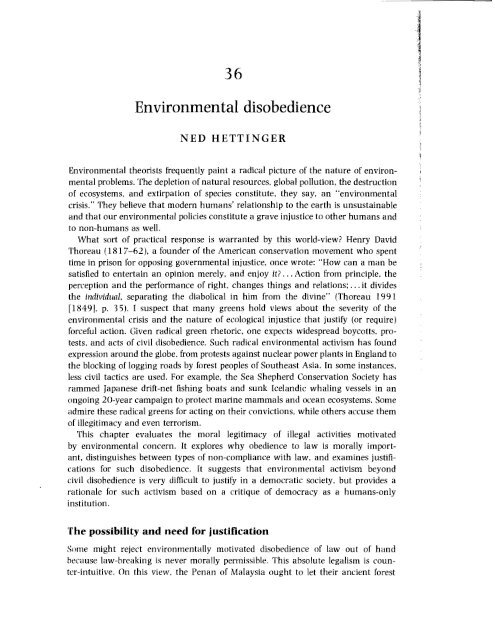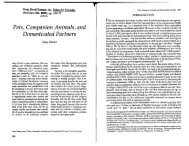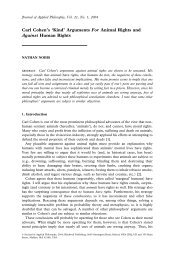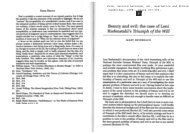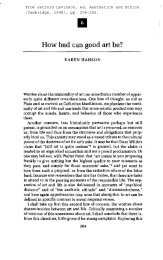36 Environmental disobedience - Ned Hettinger
36 Environmental disobedience - Ned Hettinger
36 Environmental disobedience - Ned Hettinger
You also want an ePaper? Increase the reach of your titles
YUMPU automatically turns print PDFs into web optimized ePapers that Google loves.
<strong>36</strong> <strong>Environmental</strong> <strong>disobedience</strong>NED HETTINGER<strong>Environmental</strong> theorists frequently paint a radical picture of the nature of environmentalproblems. The depletion of natural resources. global pollution, the destructionof ecosystems, and extirpation of species constitute, they say. an "environmentalcrisis." They believe that modern humans' relationship to the earth is unsustainableand that our environmental policies constitute a grave injustice to other humans andto non-humans as welLWhat sort of practical response is warranted by this world-view? Henry DavidThoreau (1817-62), a founder of the American conservation movement who spenttime in prison tor opposing governmental injustice. once wrote: "How can a man besatisfied to entertain an opinion merely, and enjoy it? ... Action from principle. theperception and the performance of right. changes things and relations: ... it dividesthe individual. separating the diabolical in him from the divine" {Thoreau 1991[18491. p. 35}. I suspect that many greens hold views about the severity of theenvironmental crisis and the nature of ecological injustice that justify (or require)forceful action. Given radical green rhetoric. one expects widespread boycotts. protests.and acts of civil <strong>disobedience</strong>. Such radical environmental activism has foundexpression around the globe. from protests against nuclear power plants in England tothe blocking of logging roads by forest peoples of Southeast Asia. In some instances,less civil tactics are used. For example. the Sea Shepherd Conservation Society hasrammed Japanese drift-net fishing boats and sunk Icelandic whaling vessels in anongoing 20-year campaign to protect marine mammals and ocean ecosystems. Someadmire these radical greens for acting on their convictions. while others accuse themof illegitimacy and even terrorism.This chapter evaluates the moral legitimacy of illegal activities motivatedby environmental concern. It explores why obedience to law is morally important.distinguishes between types of non-compliance with law, and examines justificationsfor such <strong>disobedience</strong>. It suggests that environmental activism beyondcivil <strong>disobedience</strong> is very dirticult to justify in a democratic society, but provides arationale for such activism based on a critique of democracy as a humans-onlyinstitution.The possibility and need for justificationSome might reject environmentally motivated <strong>disobedience</strong> of law out of handbecause law-breaking is never morally permissible, This absolute legalism is counter-intuitive,On this view, the Penan of Malaysia ought to let their ancient forest
ENVIRONMENTAL DISOBEDIENCE 499homes be destroyed peacefully when local authorities grant logging rights to foreigntimber companies for a percentage of the profits. Legal obligations (what the lawdemands) and moral obligations (what valid moral principles require) are conceptuallydistinct and it is not plausible that legal obligations invariably outweigh conflictingmoral obligations. One might restrict absolute legalism to Significantly justsocieties. On this view, the Penan may rightly resist the illegitimate laws of theircorrupt local government, but Earth First! members in western democracies mustobey the environmental laws they oppose.Although the legitimacy of legislative institutions is an important factor in determiningthe moral force of resulting laws, even laws issuing from democratic politicalinstitutions need not invariably be obeyed. For example, it would seem to be acceptableto destroy another's property to prevent the spread of fire or to avert a chemicalexplosion at a factory near neighborhoods. It may also be morally permissible todisobey laws sanctioned by a democratic majority when they clearly violate minorityrights. That a society is a substantially just democracy is no guarantee that all of itslaws have sufficient moral legitimacy to outweigh countervailing moral concerns inall circumstances.Not only should we reject the idea that democratically sanctioned law must alwaysbe obeyed, but we should also reject the opposing extreme that law qua law (includingdemocratically sanctioned law) has no moral claim on us. In arguing for theindependence of moral conscience from political obligation. Thoreau says: "It is notdesirable to cultivate respect for law. so much as for the right. The only obligationwhich I have a right to assume, is to do at any time what I think is right" (1991[1849]. p. 29). Martin Luther King (1929-68), the great crusader for civil rights forAfrican-Americans. appears to accept the more limited view that morally deficientlaws (rather than all laws) lack moral weight. Responding to the charge of inconsistencyin demanding that white segregationists obey laws requiring integration ofschools. while encouraging Blacks to ignore remaining segregationist laws. hewrote, "There are two types of laws; there are just and there are unjust laws. Iwould agree with Saint Augustine that 'An unjust law is no law at all'" (1991[1963]. p. 73).The suggestion is that bad laws (or all laws) lack moral weight entirely. But thismakes the fact that an act breaks the law morally irrelevant. A more reasonableapproach grants that laws (including bad laws) have moral weight, but makes theobligation to obey them "prima facie," i.e.. override able by stronger moral considerations.On this view. sometimes a person can be morally required to obey morallydeficient laws. Even when a person is morally justified in violating a law. some moralforce must be overcome. One implication is that environmental disobedients cannotsimply refer to the putative injustice or moral deficiencies of a particular law to justifytheir illegal behavior.The ground for this prima facie obligation to obey the law in a substantially justsociety is a subject oflong-standing and ongoing philosophical controversy. In Plato'sCrito. Socrates (470-399 BCE) argues that just as we should be loyal and obedient toour parents because of all they have done for us. so too we owe a duty of loyalty andobedience to the state out of gratitude for its far greater provision of benefits.Typically, environmental activists have benefited from modern states and thus mayI ifI I
500 NED HETI'INGERhave duties of loyalty and obedience to the rule of law that made this possible.Activists might, however. justifiably feel a greater sense of gratitude and loyalty tothe earth, the wellspring of life.Obedience to law is supported by a duty to promote just institutions. such asdemocratic majority rule and the resultant rule of law. Lawbreaking can damagedemocratic institutions by engendering disrespect for law and further lawbreaking.Unless they favor the overthrow of the democratic rule of law, environmental disobedientsmust be concerned with the effects of their actions on respect for and therule of law.The obligation to obey the law is also supported by a duty of fair play. The benefitsof social living are made possible by a reciprocal sharing of the burdens of society,including obedience to law. The rule of law depends on citizens being willing to obeylaws they do not like. In short, a functioning democracy requires reciprocal willingnessto lose. If environmental activists expect timber companies to obey lawspreventing stream-side cutting (for example), then it is prima facie unfair for activiststo refuse to obey laws that they oppose.Civil, militant, and revolutionary <strong>disobedience</strong>The appeals to fair play and upholding just institutions support a prima facie moralduty to obey the outcomes of democratic procedures. and thus lawbreaking byenvironmentalists in reasonably just, democratic societies requires justification. Oneentrenched position in both the philosophical literature and popular mind is that"civil <strong>disobedience</strong>" can be justified relatively easily, whereas other forms of <strong>disobedience</strong>cannot. Whether environmental lawbreakers practice civil <strong>disobedience</strong> orsome other form of non-compliance with law is important for morally assessingthese activities.In contrast to ordinary criminal lawbreaking that is motivated by self-interest,conscientious lawbreaking is motivated by a belief in the righteousness of somecause. Conscientious lawbreakers include the civil disobedient, the militant, and therevolutionary. The revolutionary finds the core principles of a political system corruptand wants to supplant the entire system. In contrast, the civil disobedient remainsfaithful to the system as a whole, while objecting to particular laws and practices.<strong>Environmental</strong> activists aiming to replace global capitalist free trade between nationstateswith self-sufficient bioregional communities are revolutionaries, while opponentsof urban sprawl are not.The civil disobedient is also not militant. Lawbreaking can attempt to improvedemocratic processes and outcomes or it can attempt to thwart them (Singer 1993, p.303). The civil disobedient tries to educate and persuade the public that the cause isjust and that laws must be changed, while the militant coerces them by bringing thedesired goal into existence despite their opposition. <strong>Environmental</strong> activists whooppose logging an old growth forest might block the road into the forest to capturethe imagination of the public. get the attention of authorities. and begin a dialogabout the ecosystem's value. Contrast this educative and persuasive function of civil<strong>disobedience</strong> with militant action designed to compel the desired change. <strong>Environmental</strong>activists might hammer nails into trees or destroy logging equipment to make
ENVIRONMENTAL DISOBEDIENCE 501logging the forest unprofitable. Such activists impose their will on the public and itsauthorities.As a way of testing and amending democratic procedure and outcomes by appealingto the public's sense of justice, civil <strong>disobedience</strong> remains faithful to the institutionof democracy, even while violating particular laws. Practiced with care. civil <strong>disobedience</strong>can improve and strengthen democratic decision-making. John Rawls comparescivil <strong>disobedience</strong> to "such things as free and regular elections and anindependent judiciary" as a mechanism that helps to "maintain and strengthen justinstitutions" (1971. p. 383). In contrast, militant lawbreaking would seem to undermine.rather than promote. just democratic institutions. Because it bypasses even theattenuated democratic procedures used by civil disobedients. militant action has thesubstantial burden of justifying an outright rejection of the obligation to obey democraticdecisions.Disobedience may be civil or uncivil in manner. A lawbreaker who acts civilly actssubmissively, courteously. and respectfully. rather than violently, rudely, or evasively.Activists who barge into a boardroom and dump trash on the table actuncivilly. while those who don a coat and tie and join the blockade act civilly.Many define "civil <strong>disobedience</strong>" to prohibit uncivil tactics. The civil disobedient, itis said. acts non-violently and accepts punishment. On this view. those who employviolence against persons or property, or evade arrest and punishment, are notengaged in "civil <strong>disobedience</strong>."There are reasons for expecting civil <strong>disobedience</strong> to be practiced civilly. Becausethe civil disobedient is neither a revolutionary nor an ordinary criminal. one expectssigns of fidelity to the system and a manifestation of sincerity and conscientiousness.Submitting to arrest and punishment is one way to manifest sincerity and an underlyingrespect for law. though it is not the only way. Additionally, civil <strong>disobedience</strong> asa mode of political speech aimed at educating and persuading the public is likely to fallwhen it involves rude, aggressive, or violent behavior. Such tactics tend to cloud themessage and make it harder for the public to hear. Furthermore. the use of violenceescalates tensions, invites violent retaliation by those against whom it is used. andoften leads to repression by the government. rather than a thoughtful response to theideas that underlie the protest.Although there are good reasons for associating politeness, submissiveness, andnon-violence with civil <strong>disobedience</strong>. to require that civil <strong>disobedience</strong> meet suchconstraints is a mistake. One could attempt to persuade the public and achieve amore genuine democratic decision by clandestine. evasive. and violent means. Sometimessuch tactics are successful. For example. in 1984. the Animal Uberation Frontbroke into a head-injury lab at the University of Pennsylvania. and stole videotapes ofstruggling monkeys strapped to devices that inflicted head injuries (Singer 1993. p.289-90: see ANIMALS). When the tapes were made public, widespread public revulsionand subsequent protests led to the closure of the lab. In certain cases. violencemight be the best (or only) way to get people to listen. One defender of environmentalsabotage argues that such acts can enhance democratic processes by insurin~ aserious public hearing for the views of those who have been effectively shut out ofthe debate: "Sometimes the use of violence serves to highlight an injustice in a way noother form of protest can match.... it is not until there is violent protest that any
S02NED HETTINGERmeaningful response to wrongs is likely to be made in many a society" (Young 1995.p. 206). Surreptitious lawbreaking and evading arrest may also be the only way tocontinue to present one's case to the public. Thus, although as a general rule thetactics of violence and evasion of arrest do not fit well with the conception of lawbreakingto enhance democratic procedures and decisions. in some circumstancescivil disobedients might resort to such uncivil tactics without inconsistency. Conversely,revolutionaries might employ civil and non-militant tactics of <strong>disobedience</strong> as atool for their goals; Mohandas Gandhi's (1869-1948) use of non-violence as a meansto undermine the British rule of India is an example.Worries about violence and letting the individual decideHow are environmental activists to know if their cause justifies taking the law intotheir own hands, perhaps militantly and violently? The seriousness of this problembecomes evident when we reflect on the views of those with whom we disagree. Somepeople believe that abortion is such an enormous evil that breaking the law. evenviolently. to prevent it is justified. The Unabomber. a quasi-environmental anarchist,believed that the cause of dismantling the industrial-technological system justifiedsending letter bombs that killed individuals whose technical skills make the systempossible (see TECHNOLOGY). Others apparently believed that their opposition to the USgovernment justified blowing up buildings with children inside. These examplesillustrate a substantial danger of allowing individuals to decide for themselves whenand to what extent they may break the law.John Rawls's defense of civil <strong>disobedience</strong> addresses this danger by not onlyeschewing violence. but also by limiting the type of justifications protestors caninvoke. For Rawls. civil disobedients may not rely on their own narrow politicalallegiances. religious convictions. or private moralities. but must appeal instead toprinciples of justice that have widespread acceptance in society (1971. p. <strong>36</strong>5).<strong>Environmental</strong> activists thus could not use Rawls's justification for civil <strong>disobedience</strong>if they appealed to radical environmental world-views (such as deep ecology) that thepublic does not share. This leads one defender of radical environmental activism todismiss Rawls's account of civil <strong>disobedience</strong> as irrelevant to non-anthropocentricenvironmental activists (List 1994). Peter Singer (1991 [1973]) has also criticizedRawls's limitation arguing that there is no reason why civil disobedients must rely onthe existing sense of justice in the society and cannot also try to reform and improvethat sense of justice. Allowing this broader appeal, however. sacrifices the publiccheck on the protestors' reasoning that Rawls's constraint provides.Unless we are willing to rule out in principle all instances of lawbreaking (or alllawbreaking of a particular type), I see no plausible alternative to allowing individualsto decide when a cause is sufficiently important to justify breaking the law and whatmeans are permissible. People are ultimately responsible for what they do or fail to do.including complying with the law. This does not mean that we must accept anysincere act of a conscientious lawbreaker as morally permissible. The justifiability ofbreaches of law depends on substantive moral issues concerning the rectitude ofcause. the appropriateness of the means used to pursue it. and whether the disobedientacts responsibly. It does not depend simply on whether there are ever justifiable
ENVIRONMENTAL DISOBEDIENCE 503examples of lawbreaking of that type. For example. that civil <strong>disobedience</strong> is sometimesmorally justifiable does not entail that every instance of it is. When LesterMaddox (a famous segregationist) openly refused to obey laws requiring that hepermit African-Americans into his restaurant. his act of civil <strong>disobedience</strong> was notjustifiable. But this does not mean we should refuse to allow individuals to decidewhen civil <strong>disobedience</strong> is morally appropriate. Similarly, leaving open the possibilitythat militant action or violence in support of environmental goals may be permissibledoes not require that we accept the Unabomber's use of violence.Allowing violence as a tactic for social change is dangerous. and many would ruleit out entirely and in principle, especially in a democratic society. Such views too oftenfail to distinguish between types of violence, equating all violent activity with terrorism,and condemning it all in absolute terms. Those who have written in defense ofthe use of violence for environmental goals make a distinction between violenceaimed at persons and violence aimed at property and have (almost) universallylimited the "violence" they condone to property destruction or sabotage. Their statedgoal is to harm no living being (human or otherwise), but to destroy the machinerythat attacks the living earth. This distinction is important. In a democratic society,violence aimed directly at persons is almost impossibly difficult to justify. Violenceagainst property does not confront nearly as high a hurdle. But we must not let thisdistinction delude us into thinking that violence against property has no harmfuleffects on people. as if only things are being hurt and not people (MorreaU 1991[1976]. p. 133). Those who own property are going to be hurt by damage to it;damaging property that no one cares about would be totally ineffective. Still. legalactivity and non-violent civil <strong>disobedience</strong> can inflict greater harm than do some actsof property destruction. A massive road-blocking protest can inconvenience thousandsand impose high costs on local governments who must arrest and prosecuteprotestors. Businesses can be more threatened and injured by legal strikes andboycotts than by small-scale sabotaging of equipment.Those who believe that violent lawbreaking can sometimes be justified argue thatthe absolute prohibitionists rely on an untenable act/omission distinction (Singer1993. p. 307fT). They point to situations where only violent illegal activity can stopothers from committing much greater violence. The earlier mentioned case of thePenan is an example. Ifpeople are responsible for acts of omission as well as for acts ofcommiSSion. then to refrain from violent activity in these situations might be wrong.Arguing that one remains morally clean simply because one did not commit theviolent act oneself is implausible. Consider the case of the rancher who put up a 28mile-long fence that threatened the lives of 1.600 pronghorn antelope which wereblocked from their wintering grounds. Is it plausible to say that an activist whorefused to cut holes in the fence has dean hands because it was the rancher. andnot she. who killed the antelope?Violent activity confronts a special and very high burden of justification. even whenit is employed as a tool of civil <strong>disobedience</strong>. Those considering violence have a solemnresponsibility to confirm their beliefs with morally sensitive and reasonable peoplewho are informed about the facts. They must seek out and seriously considerthe viewpoints and perspectives of their opponents. Mohandas Gandhi (1971[1957]) argued that because our beliefs are subject to error. no one should be so
504 NED HE'ITINGERpresumptuous as to inflict harm on others to further those beliefs. He also argued thatviolence degrades and brutalizes those who use it. Paul Watson of the Sea Shepards,who advocates the use of violent tactics (e.g., sinking whaling ships) for environmentalgoals. illustrates Gandhi's concerns:Ifyou are a self-righteous tight-ass who gets morally indignant about correct tactics.you know. the "I agree with your motives, I just can't accept your methods" type ifyou are one of THEM. then do yourself and us a favour and read Time or theGreenpeace Examiner instead. This article ... advocate[sJ the destruction of propertybecause. and pardon me for myoid-fashioned ways. I believe that respect for lifetakes precedence over respect for property which is used to take lives.... The killingof whales in 1986 is a crime. It is a violation of international law. but moreimportantly it is a crime against nature and a crime against future generations ofhumanity; Moreover, whaling is a nasty form of anti-social behavior and an atrocitywhich should be stamped out. So, I don't want any crappy letters about tradition.livelihood or Icelandic rights. (1993 [1986]. p. 172)Will those who believe they are justified in breaking the law violently invariablydisplay such absolute assurance in their cause and firm conviction that their opponentsare moral monsters? One need not disagree with Watson's cause to see thedanger here of an arrogance that demonizes the opponents and fails to take seriouslytheir perspective. Gandhi is right to focus our attention on human fallibility. Thosewho use violence must guard against the likelihood that they have an irresponsiblyhigh level of confidence in the rectitude of their cause. We must require a morehumble approach from those who pursue these most extreme of means.Justifications for militant environmental activismIf we are unwilling to rule out in principle militant <strong>disobedience</strong> to democraticallysanctioned law, then we must morally evaluate possible justifications for such activities.The most common justification offered is that the valuable consequences oftheseacts of militant <strong>disobedience</strong> are sufficiently good to outweigh their negative results(see NORMATIVE ETHICS). In his defense of the practice of sabotaging environmentallydestructive projects. Robert Young suggests that "surely it is a mistake of majorsignificance to value more highly a bulldozer or some marker pegs ... than an intactecosystem which provides support for a community of plants. insects and animals"(1995, p. 209). While such an evaluation is appealing. as Young points out there areother negative consequences of acts that destroy property. including loss of profits.potential loss of employment, and the possibility of contributing to the erosion ofrespect for the democratic rule of law. Another defender of militant <strong>disobedience</strong>,argues that "what they are fighting for is more important than respect for law....respect for the law will be of little importance in a world with polluted air and water.devoid of natural wilderness. and depleted of most of its natural variety" (Martin1990. p. 302).Such consequentialist arguments are often buoyed by drastic assessments of theseverity of the environmental crisis. If current environmental policies really arejeopardizing the life-support systems of the planet. as many environmental theorists
ENVIRONMENTAL DISOBEDIENCE 505claim, then the negative consequences of militant activism pale in comparison to theevils to be avoided. Of course, one must also argue that such tactics are effective inbringing about the desired results. Further, even if militant action is successful instopping particular ecological insults, one must show that militant environmental<strong>disobedience</strong> does not turn the public against environmental causes, and thusdamage the environmental movement as a whole. Michael Martin (1990) presentsa thorough analysis of these consequentialist arguments for militant ecoactivism inthe context of American environmentalism.While this consequentialist approach to the justification of militant eco-activismraises important issues, it is of limited significance. By its very nature, it fails toconsider non-consequentialist concerns, including the special burden of justificationwhich acts of militant <strong>disobedience</strong> must bear. From a straight consequentialistperspective. that such acts are illegal and undemocratic is not itself directly relevantto the assessment of their legitimacy. Purely consequentialist justifications also fail toexamine the relationship between environmental theory and the democratic basis ofpolitical obligation. But many green theorists argue that a commitment to participatorydemocratic procedures is part of the very substance of a deep environmentalworld-view. Those who practice militant, environmental <strong>disobedience</strong> which coercesthe majority must respond to the charge that their practices are inconsistent withtheir own values.An analysis of the relationship between democracy and environmental theory isthus crucial to the task of assessing militant environmental <strong>disobedience</strong>. If radicalenvironmentalism were not committed to the democratic basiS of political obligation,then militant tactics would not confront the Significant burden of justification createdby the democratic sanction of law. Is the deep bow ordinarily given to democraticprocedures appropriate from a radical environmental perspective?The critique of humans-only democracyNon-anthropocentric environmentalists who accept the idea that humans are plainmembers and citizens of biotic communities and not the one pre-eminent andprivileged species - can mount a serious critique of modern democracies. Democracyis a humans-only political institution. It is a political procedure that arrogates allpower. authority. and legitimacy to one out of millions of species. It is a system thatlegitimizes decision-making authority by reference to a set of abilities - namely,consent. voting, delegation - that non-humans are constitutionally unable to manifest.The vast majority of the interests, goods, and values that should count accordingto non-anthropocentric moral theory have no guaranteed standing in democraticprocedure. Democracy does allow individual humans to set aside their own interestsand cast their votes for non-human interests and value. But this merely highlights theinjustice of a system that prohibits non-humans from counting politically in their ownright (see POUTICS).It might be objected that because non-humans are incapable of political participation.it is not democracy's fault that they are disenfranchised. for any way ofstructuring political participation would have this result. If the aim of politicalinstitutions is to find decision procedures that fairly adjudicate between all
506 NED HETTINGERparticipants making claims on what should happen and to orchestrate decisions basedon differing views about what should be done. then criticizing a political system forleaving out beings which make no claims and have no views is misguided. But if theaim of political institutions is to give fair. equal. and just consideration to all value.goods. and interests affected by a decision and to include in some fashion all beingswhich have a stake in the decision. then democracy can be criticized for not doing thisadequately. A system that requires political participation as a prerequisite for inclusionin the determination of legitimate authority is not a just institution for thosebeings that cannot participate.The suggestion that democracy is in principle unjust from a deep non-anthropocentricperspective can be evaluated by considering attempts to restructure democracyto include non-human nature (Mathews 1995). Robyn Eckersley proposes to"incorporate the interests of the non-human community into the ground rules ofdemocracy" and "secure the protection. or ... systematic consideration. of nonhumaninterests that might be at odds with generalis able human interests" (1995.pp. 169. 179) Because non-humans cannot represent themselves. what is needed areinstitutional forms that create trusteeship roles by which humans carry out fiduciaryresponsibilities toward non-human beneficiaries. Such legal guardians might administera trust fund. instigate legal action. and levy fines to prevent or make good injurysuffered by non-humans. Eckersley suggests the establishment of an EnvironmentDefender's Office. a well-funded independent agency that has legal authority to"scrutinise the implementation of environmental legislation and instigate actionsagainst governments, corporations and individuals in cases where biodiversity interestsare infringed" (ibid. p. 193).An even more important strategy for including non-humans in political systems isto specify and legally enforce rights of non-human nature. Just as human rights limitwhat democratic majorities can do to other humans. non-human rights could be usedto limit what democracies are allowed to do to non-humans. Eckersley puts thesuggestion as follows:Certain fundamental rights of non-human species (such as the right to exist) shouldbe incorporated and entrenched alongside fundamental human rights in a constitutionalbill of rights to ensure that they are not "bargained away" by a simplemajority ... Any legislation. or any administrative or other decision. that authorisedaction that posed a threat to the survival of endangered species could be challengedas constitutionally invalid. (ibid. p. 181)Assuming their scope was broad and their content was Significant. rights of natureenshrined in the constitutions of modern democracies would be a serious step towardincluding non-humans in democracy.Although rights for nature would prevent democratic abuse of basic goods and thevalue of non-human nature. such rights would fail to assure that political institutionsconsider non-humans in decisions that do not affect their constitutional rights. Torectify this deficiency. a truly non-anthropocentric democracy would set aside significantnumbers of legislative seats to be held by human trustees of the interests.goods. and value of non-human nature. These nature guardians would vote on behalf
ENVIRONMENTAL DISOBEDIENCE 507of non-humans. To insure that these surrogates do not backslide and vote for humaninterests over non-human interests. their votes would have to be justified by referenceto bona fide environmental values. While such a procedure would not insure uniquesolutions. it would rule out particularly self-serving votes. Christopher Stone (1974.p. 40). one of the first to propose legal rights for nature and who suggested givingadditional representatives to regions that had more Significant natural areas. foundhis own ideas so shocking that he said: "I am not saying anything as silly as that weought to ... retreat from one man-one vote to a system of one man-or-tree one vote."But unless we advance beyond one human-one vote. claims that a democracy is notfor humans only will be unpersuasive.These structural changes in democratic decision-making include a non-anthropocentricperspective in the political arena and provide political standing for non-humannature. Such procedures should result in policies that respect the flourishing and selfunfoldingof non-human forms of nature. Just as a human democracy manifestsrespect for human autonomy. so a more-than-human democracy would respect theself-determination of both non-humans and humans. Substantively. this respectwould involve humans refraining from interfering with non-human lives and processes.except when required by fundamental human needs and values. Naturerepresentatives would make non-interference their basic policy objective; they wouldlobby and vote to allow non-human nature to fulfill its own destiny. as far as possibleindependent of human manipulation and controL (Human involvement with naturethat did not compromise nature's autonomy would be encouraged.) This conception ofthe fundamental value that humans ought to respect in nature addresses the concernthat. in a more-than-human democracy. humans would have the epistemically preposteroustask of determining what is good for or of value in non-human nature. It alsoaddresses the worry that such a system would involve humans treating non-humanspaternalistically. sometimes even deciding how to resolve conflicts between them. Byinsisting that respect for non-human nature requires letting nature unfold autonomouslyas much as is compatible with satisfying fundamental human needs and values.we avoid paternalist intervention and manifest the respect that we so value in ourrelation with other humans also in our relation with the non-human world.Implications for militant <strong>disobedience</strong>These suggestions for a more-than-human democracy show that non-anthropocentricenvironmentalists need not give up on democracy as an inherently unjustpolitical system. and thus they need not strive to overturn democracy entirely.Nonetheless. modern democracies are far from embodying political structures compatiblewith non-anthropocentric environmentalism. Transcending humans-onlydemocracy requires radical. some might say revolutionary, changes in current democraticstructures.Given this critique of modern democracies from a non-anthropocentric perspective.non-anthropocentric. environmental activists are not morally obligated to pursueonly democratic means of change. Arguing that these radical environmentalistsmust limit themselves to lobbying and voting as their mechanisms for change, orclaiming that civil <strong>disobedience</strong> is the outer limit oftheir permissible activism, ignores
508 NED HEITINGERthat. from their perspective. current democratic procedures are ecologically unjust.Why should they limit themselves to means sanctioned by a system they believe to becorrupt as currently constituted? If their use of civil <strong>disobedience</strong> to appeal to thesense of justice of the majority fails to move humans toward ecological justice and amore-than-human democracy. then militant tactics would seem to be a morally openoption. The significant burden of justification against lawbreaking that democraticinstitutions create crumbles under this non-anthropocentric critique of democracy.The obligation to obey laws that protect the ongoing. drastically unjust. humantreatment of nature is specious when such laws are sanctioned by a system thatsystematically excludes just consideration of the value. goods. and interests of nonhumannature. In one way. radical environmentalists who engage in militant lawbreakingact undemocratically. though. as I have argued. with potential justification.In another way. however. they can be seen as acting under the guise and legitimacyof more-than-human democratic norms they believe ought to govern our society.This does not mean that radical environmentalists may see all laws as lackingmorally binding force. Rather, the illegitimacy is limited to those laws that importantlyatTect the human treatment of nature. Furthermore. that militant lawbreakingmight be morally permissible does not mean that it should be undertaken. Practicalquestions must be addressed about whether such lawbreaking will successfullyadvance the cause of protecting nature and ultimately move human societies towardmore environmentally just democratic systems. It is here that consequentialist andpragmatic reasoning become important.ConclusionI have argued that obedience to law is a serious prima facie obligation based on theduty to uphold and play fairly by democratic political institutions. Civil <strong>disobedience</strong>when practiced civilly is far less difficult to justify than are either militant action oruncivil <strong>disobedience</strong>. In particular. direct violence against persons faces an almostimpossibly high justificatory burden. Letting individuals decide when to break the law,perhaps militantly, violently. or evaSively, is a seriously troubling position. yet one thatis preferable to ruling out these types of <strong>disobedience</strong> in principle. In the final analysis.whether an instance of lawbreaking is morally permissible depends on the substantivemoral issues involved and on the responsibility and humility of those who so act.JUstifications for eco-activism beyond civil <strong>disobedience</strong> must not onty show that theconsequences of such actions are good overall. but they must also address a substantialburden of justification placed on those who fail to comply with democratically sanctionedlaw. Until modern societies move toward more-than-human democracies. nonanthropocentricenvironmentalists can successfully respond to this burden by arguingthat humans-only democracies are fundamentally unjust (see LAW).ReferencesEckersley, R. (1995) "Liberal democracy and the rights of nature: The struggle for inclusion."<strong>Environmental</strong> PolWcs 4. pp. l69-98. [Thought-provoking suggestions for a non-anthropocentricdemocracy.J
ENVIRONMENTAL DISOBEDIENCE 509Gandhi. M. K. (1971 [1957]) "Non-violence." in Civil Disobedience and Violence. ed. J. G. Murphy(Belmont. CA: Wadsworth Publishing Company). pp. 93-102 [Elegant and forceful defense ofnon-violence in an out-of-print but extremely useful volume.]King. M. L. (1991[1963]) "Letter from Birmingham city jail," in Civil Disobedience in Focus. ed.H. A. Bedau (London: Routledge). pp. 68-84 [Most famous document ofAmerican civil rightsmovement and compelling defense of civil <strong>disobedience</strong>.]List, P. C. (1994) "Some philosophical assessments of environmental <strong>disobedience</strong>." in Philosophyand the Natural Environment. ed. R. Attfield and A. Belsey (Cambridge, England: CambridgeUniversity Press), pp. 183-98. [An assessment for eeo-activism of Carl Cohen's andJohn Rawls's accounts of civil <strong>disobedience</strong>.]Martin. M. (1990) "Ecotage and civil <strong>disobedience</strong>," <strong>Environmental</strong> Ethics 12, pp. 291-310. [Afavorable utilitarian assessment of eeo-sabotage.]Mathews. F.. ed. (1995) "Ecology and democracy," <strong>Environmental</strong> Politics (special issue).[Excellent volume on liberal democracy's ability to respond to the environmental challenge.]~lorreall. J. (1991 [1976]) "The justifiability of violent civil <strong>disobedience</strong>," in Civil Disobediencein Focus. ed. H. A. Bedau (London: Routledge). pp. 130--43. [Analysis of violence showingthat if ordinary civil <strong>disobedience</strong> is acceptable. so is more violent <strong>disobedience</strong>.]Plato (1991) "Crito." in Civil Disobedience in Focus. ed. H. A. Bedau (London: Routledge). pp.13-27 [Classic defense oflaw abidingness.]Rawls. J. (1971) A Theory of Justice (Cambridge. MA: Harvard University Press). [Most influentialbook on political philosophy in the second half of the twentieth century.]Singer. P. (1991 [1973]) "Democracy as a plea for reconsideration." in Civil Disobedience inFocus, ed. H. A. Bedau (London: Routledge). pp. 122-9. [Critique of Rawls on civil <strong>disobedience</strong>.]--(1993) Practical Ethics, 2nd edn (Cambridge, England: Cambridge University Press).[Chapter 11 is excellent on the ethics of lawbreaking.]Stone, C. D. (1974) Should Trees Have Standing? Toward Legal Rights for Natural Objects (Los Altos,CA: William Kaufman, Inc.). [Sophisticated. enVironmentally motivated, legal philosophy.]Thoreau. H. D. (1991 [1849]) "Civil <strong>disobedience</strong>." in Civil Disobedience in Focus. ed. H. A.Bedau (London: Routledge), pp. 28--48. [Skepticism about government and powerful plea forindividual responsibility.]Watson, P. (1993 [1986]) "Raid on Reykjavik," in Radical EnVironmentalism: Philosophy andTactics, ed. P. C. List (Belmont, CA: Wadsworth, Inc.). pp. 172-6. [Reprinted from the EarthFirst! Journal.]Young, R. (1995) .. 'Monkeywrenching' and the processes of democracy," <strong>Environmental</strong>Politics 4, pp. 199-214. [Best philosophical defense of eco-sabotage.]
Blackwell Companions to Philosophy A Companion to <strong>Environmental</strong> Philosophy Edited byDALE JAMIESON II] BLACI(WELL Publishers


